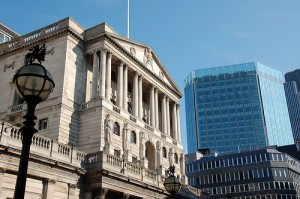 With inflation exceeding the official Bank of England target for the eighteenth month in a row, Tony Dolphin considers the reasons for the Bank’s failure and examines the implications for interest rates.
With inflation exceeding the official Bank of England target for the eighteenth month in a row, Tony Dolphin considers the reasons for the Bank’s failure and examines the implications for interest rates.
Consumer price inflation in June was 4.2%, a whole 2.2% above its target rate. Inflation has now been 1% or more above the target rate for 18 consecutive months. And in the short-term most forecasters – including the Bank of England – expect it to go even higher. It could peak at around 5% later this year. In one sense, therefore, the Bank of England, or rather the Monetary Policy Committee (MPC), has failed over inflation. It has not delivered the 2% rate that it is mandated to achieve.
Throughout this period, the MPC has justified keeping interest rates at their record low level of 0.5% (where they have been since March 2009) by persistently forecasting that inflation would drop back to 2%. Most mainstream forecasters have held similar expectations. The MPC’s failure has not been to set the wrong interest rate, given the inflation outlook; it has been to get the inflation outlook wrong.
Putting aside the effect on inflation of January’s increase in the standard rate of VAT to 20% – which everyone would accept was a one-off – the Bank’s forecasting error largely reflects a failure to predict developments in oil and other commodity prices, particularly food prices. Over the last year, food prices are up 6.5%, as are electricity and gas prices (with more large increases in the pipeline) and petrol prices are up 15%.
These prices are, for the most part, determined by developments in global markets. Strong demand from emerging economies, which rebounded from the global recession far faster than developed economies, has pushed up world commodity prices. Generally speaking, domestic inflation pressures in the UK have remained subdued – much as the Bank expected.

This presents the MPC with a dilemma. Commodity prices are very volatile and thus horrendously difficult to forecast. It is also unable to control them. How much weight should it give to uncertain developments in global markets, compared to the more predictable outlook for the UK?
A minority group on the MPC, who have been voting in recent months for increases in interest rates, argue that higher inflation is bad whatever its source and that it is important for the MPC’s credibility to be seen to be tackling it.
However, they can be accused of giving too much weight to developments in the past and not enough to what might happen in the future. Increasing interest rates now will not lower historical inflation and, given subdued domestic inflation pressures, could only be justified if global pressures were expected to remain high. It is hard to be confident that this will be the case, not least because commodity prices are so volatile.
It would be different if domestic inflation expectations were increasing and there were signs that a higher rate of inflation might become ‘locked in’, even if commodity prices fall back. But there is little evidence that this is the case. While surveys show that households and businesses expect inflation to be high in 2011, this is largely a reflection of the current rate. If these expectations were being carried into wage bargaining by employers and employees, there would be real grounds for concern but there is no sign of this is happening. Average earnings increased by only 2% over the last year.
Domestic inflation pressures in the UK are so low because the economic recovery is very weak. Real GDP did not increase at all between the third quarter of 2010 and the first of 2011 and the National Institute for Economic and Social Research (NIESR) believes it may only have expanded by 0.1% in the second quarter of the year. This is largely the result of a squeeze on households’ spending power. Real disposable incomes fell by 2.7% over the year to the first quarter of 2011 – their largest annual decline since 1977. Retail sales have been flat for the past year and overall consumer spending is down 0.5% (and it would have fallen further if the saving ratio had not dropped from 6.2% to 4.6%). Imagine how much worse these figures would have been if interest rates had been increased and households had had to deal with increased mortgage payments too.
It is likely that the economic outlook has also deteriorated as a result of the government’s decision to cut its fiscal deficit aggressively. Although cuts in public spending have only just begun, the increase in VAT to 20% is part of the reason why households are being squeezed. Just as important, the announcement last September of substantial cuts in spending appears to have had a significant, negative effect on confidence among businesses. Surveys show confidence in the service and manufacturing sectors has declined since then. In part, therefore, the MPC has had to keep interest rates low to offset the negative effects of a tighter fiscal policy.
In the medium-term, the MPC may need to adapt its approach to inflation targeting to reflect the fact that shocks to inflation in the UK are more likely to be caused by external than domestic factors. When the economy is close to full employment, the risk that a positive external shock to inflation could lead to a permanent rise in inflation expectations will be significant and present a major challenge.
However, in the short-term, the MPC’s strategy is perfectly coherent and justified. The outlook for inflation – in so far as it can be forecast – does not justify an increase in interest rates at a time when fiscal policy is being tightened aggressively and domestic confidence, spending and inflation pressures are all low.







